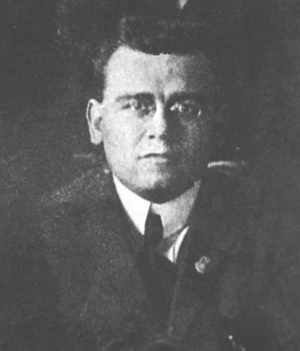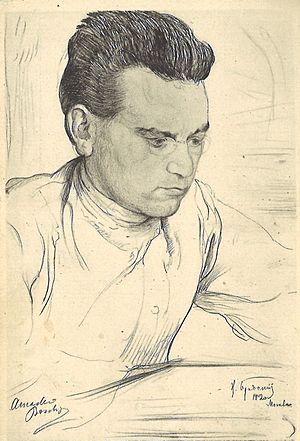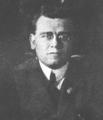Amadeo Bordiga facts for kids
Quick facts for kids
Amadeo Bordiga
|
|
|---|---|

Bordiga in 1924
|
|
| General Secretary Communist Party of Italy | |
| In office January 1921 – January 1924 |
|
| Preceded by | Position established |
| Succeeded by | Antonio Gramsci |
| Personal details | |
| Born | 13 June 1889 Resina, Campania, Kingdom of Italy |
| Died | 23 July 1970 (aged 81) Formia, Lazio, Italy |
| Political party | Italian Socialist Party Communist Party of Italy International Communist Party |
Amadeo Bordiga (born June 13, 1889 – died July 25, 1970) was an important Italian thinker and revolutionary. He helped start the Communist Party of Italy (PCI). He was also a key member of the Communist International (Comintern). Later, he became a leader in the International Communist Party. Bordiga was known as a major figure in Left communism in Europe.
Contents
Who Was Amadeo Bordiga?
His Family and Early Life
Amadeo Bordiga was born in 1889 in Resina, a town near Naples, Italy. His father, Oreste Bordiga, was a respected expert in farming science. His mother, Zaira degli Amadei, came from an old family in Florence. Amadeo's grandfather was involved in the Risorgimento, a movement that united Italy. His uncle, Giovanni Bordiga, was a mathematician and also part of the Risorgimento.
Bordiga grew up in a family that valued both science and radical ideas. In 1910, his high school physics teacher introduced him to the Italian Socialist Party (PSI). Bordiga was against Italy's war in Libya at the time. In 1912, he started the Karl Marx Circle. He also earned his engineering degree from the University of Naples Federico II that same year.
His Personal Life
Amadeo Bordiga married Ortensia De Meo in 1914. They had two children, Alma and Oreste. After Ortensia passed away in 1955, Bordiga married her sister, Antonietta De Meo, in 1965.
Amadeo Bordiga's Political Journey
Joining the Italian Socialist Party
In the Karl Marx Circle, Bordiga developed his ideas about political parties. He believed a party should bring together people with similar goals. He thought it shouldn't just be about teaching or getting votes. Bordiga was strongly against representative democracy, which he saw as linked to rich people's elections. He wrote in 1914 that socialism was completely against democratic action. He also opposed Freemasonry, seeing it as a non-secular group.
Founding the Communist Party of Italy
After the October Revolution in Russia, Bordiga joined the communist movement. He formed a group within the Italian Socialist Party that was against taking part in regular elections. This group, along with others, created the Communist Party of Italy (PCd'I) in January 1921. This happened after a long struggle within the PSI. The PSI had agreed to join the Comintern (Communist International) but refused to remove its more moderate members.
Bordiga attended the 2nd Comintern Congress in 1920. He added two points to the rules for joining the Comintern. However, Vladimir Lenin criticized Bordiga in his book "Left-Wing" Communism: An Infantile Disorder. This was because Bordiga was against participating in parliamentary elections.
Bordiga believed the party was the "brain" of the working class. Its job was to work for an armed uprising, take power, and then use it to create a communist society. He thought the party's direct goal should be to establish its own rule. Most PCd'I members agreed with him. But this led to disagreements with the Comintern. In 1921, the Comintern adopted a new plan: working with other groups to fight for reforms. Bordiga saw this as a return to old, failed tactics.
Bordiga and his group, known as the Italian communist left, accepted the Comintern's decision out of discipline. However, their position became difficult. In February 1923, Bordiga was arrested by Benito Mussolini's new government. He had to leave his role in the PCd'I. After he was found innocent, he chose not to reclaim his position. This showed he was now part of the opposition.
By 1924, a group loyal to Moscow took control of the PCd'I. Their leader, Antonio Gramsci, became the General Secretary. At the PCd'I's Third Congress in 1926, Bordiga's ideas were rejected. The ideas of the Stalinist group were accepted instead.
Time Under Arrest
In December 1926, Mussolini arrested Bordiga again. He was sent to prison on the Italian island of Ustica. There, he met Antonio Gramsci and they became friends again, working together despite their political differences. Bordiga was worried about Gramsci's health. In 1928, Bordiga was moved to the Isle of Ponza. He built several houses there and returned after his release in 1929 to finish them.
His Opposition and Later Years
After his release, Bordiga did not rejoin the PCd'I. He was actually expelled in March 1930. He was accused of supporting the ideas of Trotskyism. After this, Bordiga left political activity until 1943. He refused to discuss politics even with close friends. However, many of his former supporters went into exile. They formed a political group called the Italian communist left.
These members formed the Left Fraction of the Communist Party of Italy in 1928. This group believed that the PCd'I and other communist parties had become against the revolution. Bordiga's followers, known as Bordigists, believed that the party's ideas were everything. They thought having many members was not as important. After World War II, Bordiga worked with many of these comrades again.
The International Communist Party
After 1944, Bordiga returned to politics in Naples. He first joined a group called the Fraction of Socialists and Communists. When this group joined the Internationalist Communist Party (PCInt), Bordiga did not join right away. However, he wrote for their newspapers without using his name. He believed revolutionary work was a group effort, not about individual fame. Bordiga officially joined the PCInt in 1949.
In 1951, the party split into two groups. Bordiga sided with the group that became the International Communist Party. He wrote many articles for their newspaper, Il Programma Comunista. Bordiga stayed with the ICP until he died in Formia in 1970.
Amadeo Bordiga's Ideas
Bordigism is a specific type of left communism based on Bordiga's ideas. His followers in the Italian Socialist Party were the first to refuse to take part in parliamentary elections.
Views on the Soviet Union
Bordiga believed the Soviet Union was actually a capitalist society. He wrote about the capitalist nature of the Soviet economy. He looked at farming in the Soviet Union. He showed how capitalist relationships existed in collective farms (kolkhoz) and state farms (sovkhoz). He pointed out that much of the country's farm produce came from small private plots. He even predicted that the Soviet Union would start importing wheat. This was a big change, as Imperial Russia had been a major wheat exporter.
Bordiga thought that leaders like Joseph Stalin and Mao Zedong were not truly building socialism. He saw their revolutions as extensions of earlier capitalist revolutions. He believed they focused on taking over property and developing production. But he felt this was not the same as building a truly communist society.
Thoughts on Democracy
Bordiga called himself anti-democratic. He believed he was following the ideas of Karl Marx and Friedrich Engels. However, his dislike of democracy was not like the single-party state of Stalin. He saw fascism and Stalinism as the end result of bourgeois democracy. For Bordiga, democracy meant controlling society as a shapeless group.
Instead, he supported the dictatorship of the proletariat. This would be put in place by the communist party. It would follow the ideas from The Communist Manifesto. He often quoted Engels, who said that "all the forces of reaction will be against us under the banner of 'pure democracy'". This was because many groups against the Bolsheviks in 1921 called for councils without Bolshevik control.
Bordiga also believed that revolutionary ideas should not come from a democratic process of different views. He thought that the Marxist view showed that communism is about specific ideas and goals. For Marxists, communism is not just an ideal. It is a real movement that grows from the old society with clear tasks.
Against the United Front
Bordiga strongly disagreed with the Comintern's shift in 1921. As leader of the Communist Party of Italy, he refused to use the "united front" strategy. This strategy involved working with more moderate groups. He also refused to combine his newly formed party with the left-wing of the Italian Socialist Party.
Bordiga had a very different idea of the party. The Comintern was trying to adapt to a time when revolutions were slowing down. This was seen in events like the Anglo-Soviet Trade Agreement, the Kronstadt rebellion, and the New Economic Policy.
Bordiga believed that the Comintern's plan to gain more members by working with social democrats was a surrender. He thought it was giving in to a period of anti-revolutionary change. This was why he criticized democracy. He felt that to win over the masses, the Comintern was making too many compromises. For Bordiga, the party's ideas were everything. Having many members was not as important. He believed the party's role during a slow period was to protect its core ideas. It should continue spreading its message until the next wave of revolution.
Bordiga's ideas offered a way to see a major decline in the world communist movement starting in 1921. This was earlier than many others, who often pointed to 1927. He called himself a Leninist throughout his life. He never directly argued against Lenin. But his different view of the 1921 situation and his opposition to Lenin and Trotsky on the united front show a key turning point.
What is Communism?
Most Leninists see socialism and communism as different stages. Bordiga, though considered "more Leninist than Lenin," did not separate them in the same way. He saw socialism as the early stage of communism. It's how communism looks when it first emerges from capitalism.
For Bordiga, both stages of a socialist or communist society would not have money, capital, or markets. The main difference was that in the earlier stage, goods might be rationed. People would exchange "a given amount of labor in one form for an equal amount of labor in another form." Also, differences between city and country workers might still exist. In the later stage of communism, "bourgeois law" would be gone. Everyone would be treated equally, and people would become a new "Social Man."
Bordiga disagreed with the idea of "free producer economies." He believed that under communism, both production and consumption would serve society as a whole. This view set Bordiga apart from other Leninists, especially Trotskyists. They often thought money and markets would still exist in socialism. But Bordiga believed these exchange systems would disappear before the socialist stage was fully reached.
His Legacy
Who He Influenced
Jacques Camatte started writing to Bordiga when he was 19, in 1954. Bordiga had a long-lasting relationship with Camatte and greatly influenced his ideas. Camatte's early work was very much in line with Bordiga's thinking. Bordiga often wrote for Camatte's journal Invariance near the end of his life. Even after Camatte moved away from Marxism, his focus on "Gemeinwesen" (community) in Marx's work showed Bordiga's emphasis on group effort over individual ideas.
Bordiga also influenced Gilles Dauvé. He had a big impact on Ultra-leftist movements in the 20th and 21st centuries.
His General Legacy
The Amadeo Bordiga Foundation was started in 1998 in Formia. This was in the house where Bordiga spent his last months. The foundation publishes Bordiga's works and encourages people to explore his ideas further.
In August 2020, the journal Historical Materialism published The Science and Passion of Communism. This book is a collection of Bordiga's writings translated into English.
See Also
 In Spanish: Amadeo Bordiga para niños
In Spanish: Amadeo Bordiga para niños
- International Communist Party
- Left-communism
- Leninism
Images for kids
 | John T. Biggers |
 | Thomas Blackshear |
 | Mark Bradford |
 | Beverly Buchanan |




